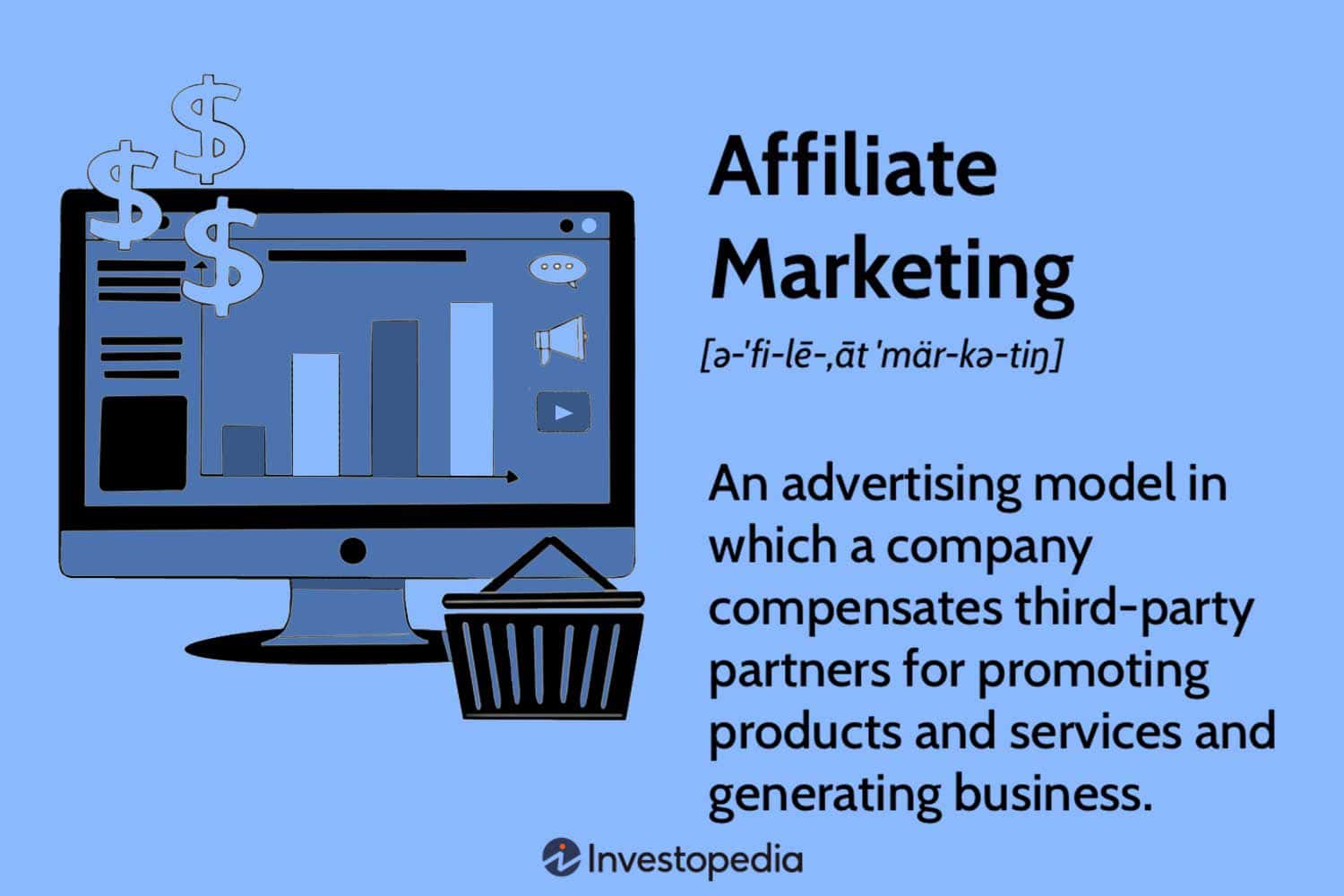Key Takeaways
-
Retirement income can be supplemented by starting a blog that aligns with your passions and expertise.
-
Initial costs are minimal, usually around $5-$20 for a domain name, $50-$200 per year for hosting, and $100-$500 for (optional) brand design.
-
Content creation should focus on topics that resonate with your audience, with a consistent posting schedule.
-
Monetization can be achieved through various strategies such as affiliate marketing, advertisements, and selling digital products.
-
Engaging with your audience on social media and optimizing your blog for search engines are crucial steps for growth.

“Affiliate Marketer: Definition …” from www.investopedia.com
Unlock the Power of Blogging for Sustained Income
Imagine turning your years of wisdom and hobbies into a source of income that you can manage from the comfort of your home. That’s the beauty of blogging for retirees. It’s not just about the extra cash; it’s about staying active, connected, and mentally stimulated.
Why Blogging is a Goldmine for Retirees
Why blogging, you ask? Well, it’s simple. Blogging gives you the freedom to express yourself, share your knowledge, and connect with like-minded individuals. Plus, it’s flexible. You can write when you want, about what interests you, and from wherever you are. And the best part? Your blog can generate income long after you’ve published your posts.
The Basics of Starting Your First Blog
First things first, let’s talk about setting up your blog. It’s easier than you might think. You’ll need a domain name that reflects your blog’s personality, hosting to keep your blog accessible on the internet, and a design that invites readers in. Remember, your blog is your digital home; make it welcoming.

“Passive Income Through Blogging …” from www.financestrategists.com
Choose Your Niche: Align Passion with Profitability
Choosing a niche is like picking the perfect outfit for a party. You want it to reflect who you are, but also to be appealing to the other guests. Your blog’s niche should be a blend of your passions and what people are interested in reading about.
Finding Your Blogging Sweet Spot
Think about your hobbies, experiences, and expertise. What can you talk about for hours without getting bored? That’s your sweet spot. It could be anything from gardening to personal finance, or even model trains. Your enthusiasm will attract readers who share your interests.
Analyzing Market Demand for Your Niche
Now, let’s make sure there’s an audience for your passion. A quick online search can tell you what people are curious about. Look for forums, social media groups, and other blogs in your niche. Notice any gaps in the information available? That’s where your blog can shine.
Example: If you’re a gardening enthusiast, you might find that there’s a high demand for organic gardening tips but not many resources available. This could be the perfect niche for your blog.

Create Content That Resonates
Content is king, and in the realm of blogging, it reigns supreme. Your words have the power to inform, entertain, and inspire, but only if they resonate with your readers. That’s why understanding your audience’s needs and interests is paramount.
Developing Relevant and Engaging Topics
Take a moment to think about what your readers are searching for. What problems do they have that you can solve? What joys can you share that will brighten their day? This is the foundation of content that not only attracts readers but keeps them coming back for more. My chosen topic for this blog is starting a retirement business, and you can explore other ideas than blogging on this site.
I have a second blog about insomnia: InsomniaZone.com because I’ve been a long-term sufferer and it’s really interesting how I’m expanding my knowledge from blogging.
Mastering Consistency in Your Blogging Routine
For example, if you decide to blog about healthy eating in retirement, a consistent routine might include “Meatless Monday” recipes, “Wellness Wednesday” tips, and “Foodie Friday” restaurant reviews.
Consistency doesn’t mean you have to blog every day; it means setting a schedule and sticking to it. Whether it’s once a week or twice a month, a predictable posting routine keeps your audience engaged and looking forward to your next piece.
And let’s not forget variety. Mix up your content with how-to guides, personal stories, interviews, and reviews. A diverse content strategy keeps your blog fresh and interesting.
Remember, engaging content is authentic content. Write as you speak, share from your experiences, and always be genuine. Your readers will appreciate the honesty and come to trust your voice.
Now, let’s explore how to turn your content into a source of income.
Turning Words into Wealth: Monetization Strategies
There are several ways to monetize your blog, and the best approach depends on your niche and audience. Let’s explore some proven strategies to turn your blog into a money-making machine.
It’s important to note that monetization takes time and effort. Don’t expect overnight success; building a profitable blog is a marathon, not a sprint.
Affiliate Marketing: Earning Commissions Effortlessly
Affiliate marketing is like being a salesperson for products you love, without the pressure. You recommend products to your readers, and if they buy through your affiliate links, you earn a commission.
It’s crucial to only promote products you believe in and that align with your niche. Your readers trust your recommendations, so choose wisely.
-
Join affiliate programs that fit your blog’s topic.
-
Include affiliate links naturally within your content.
-
Disclose your affiliate relationships to maintain trust.
Remember, transparency is key. Always let your readers know when you’re using affiliate links.
Advertisement Revenue: How to Profit from Your Page Views
Advertisements can be a passive way to earn income from your blog. You can sign up for ad networks like Google AdSense, which will place relevant ads on your site. When visitors click on these ads, you get paid.
It’s a balancing act, though. Too many ads can overwhelm your readers and detract from your content. Find a happy medium that respects your audience’s experience while still capitalizing on your traffic.
Creating and Selling Digital Products or Services
Have you considered creating an ebook, online course, or offering consulting services? These are fantastic ways to leverage your expertise and provide value to your readers beyond the blog.
For example, if you’re a retired financial advisor, you could create a course on managing finances in retirement. This not only establishes you as an authority but also gives your readers a valuable resource they’re willing to pay for.
Social Media and Blogging: Growing Your Audience
Social media isn’t just for the young; it’s a goldmine for bloggers looking to expand their reach. Platforms like Facebook, Twitter, and Instagram allow you to connect with readers on a personal level and drive traffic to your blog.
Leveraging Social Platforms to Drive Traffic
Use social media to share snippets of your blog posts, engage with your readers, and join conversations related to your niche. It’s not just about broadcasting your content; it’s about building relationships.
Most importantly, don’t spread yourself too thin. Focus on one or two platforms where your audience is most active, and grow from there.

“Affiliate Marketing …” from www.beautiful.ai
Engagement Tactics: Building a Community Around Your Blog
Engagement is the heart of community building. Respond to comments, ask for feedback, and encourage readers to share their stories. When your audience feels heard, they become loyal supporters of your blog.
Organize live Q&A sessions, polls, or contests to keep the interaction lively. The more your readers engage with your content, the more invested they become in your blog’s success.
Navigate SEO: Get Found on Google
SEO, or search engine optimization, is how you get your blog noticed by Google. It’s about making sure your blog shows up when people search for topics you write about.
Keyword Research: Speaking Google’s Language
Keywords are the words and phrases people type into search engines. Use tools like Google Keyword Planner to find terms that are relevant to your niche and that people are searching for. Incorporate these keywords naturally into your blog posts to improve your visibility.
But remember, while SEO is important, always prioritize your readers’ experience over search engine algorithms. Write for people, not just for Google.
Optimization Techniques for Better Blog Visibility
Optimization isn’t just a fancy word for making your blog look pretty. It’s about fine-tuning your blog so that when people search for topics you write about, your blog pops up like a friendly wave in a sea of internet content. Think of SEO as your blog’s megaphone to the world.
Maintain and Grow Your Retirement Income
As your blog grows, so can your income. But it’s not just about making money—it’s about maintaining and increasing that flow so it becomes a reliable part of your retirement plan. Stay curious, stay adaptable, and remember, the learning never stops.
Understanding Analytics to Adapt and Thrive
Analytics are your blog’s report card. They tell you who’s visiting, what they’re reading, and where they’re coming from. Use this data to understand what’s working and what’s not. Then, tweak your content strategy accordingly. It’s like having a conversation with your audience without them saying a word.
Tools like Google Site Kit can seem intimidating at first, but they’re actually quite user-friendly. They provide valuable insights that can help you make informed decisions about your blog’s direction.
Diversifying Income: When One Stream Isn’t Enough
Don’t put all your eggs in one basket. That’s a golden rule for blogging income. Diversify your income streams to protect against the unexpected. Besides affiliate marketing and ads, think about sponsored posts, writing paid reviews, or even offering online courses. Variety is not just the spice of life; it’s the lifeline of your blog’s finances.
For instance, if a product you’re affiliated with is discontinued, having other sources of income means you’re not left in the lurch. Adaptability is key to a sustainable blogging career.
FAQs
Got questions? I’ve got answers. Here’s the rundown on some of the most common queries I get from aspiring retiree bloggers.
How Can I Learn More About Blogging
Blogging is one of the modules in Master Affiliate Program which you can learn more about here.
More detailed blogging training (and a free trial) is here.
What Are the Initial Costs Associated with Starting a Blog?
Starting a blog doesn’t have to break the bank. You’ll need a domain name, which usually costs $5-$20. Hosting, which is like renting space on the internet for your blog, will set you back $50-$200 per year. And if you want your blog to look snazzy, budget $100-$500 for brand design, but you can add that in later once you’ve seen you enjoy blogging and can commit to a regular schedule. These are ballpark figures, but they give you a good idea of the initial investment.
Many of those costs are included in the Wealthy Affiliate University above.
How Long Does It Take to Start Earning from a Blog?
Every blog is different, but on average, it takes about 6 months to a year to start seeing income from a blog. That’s assuming you’re posting consistently and engaging with your audience. It’s a slow burn, but the potential for passive income is worth the wait.
Patience is not just a virtue; it’s a necessity in the blogging world. Don’t get discouraged if you don’t see immediate results. Keep at it, and the rewards will follow.
For instance, on another blog of mine I reviewed an affiliate program last July, and made an unexpected sale in December, because someone had been searching Google for reviews. I’d made sales from other methods back in July, then stopped promoting, so it was a complete surprise when the December sale came in. I asked my customer and she told me she’d found it on my blog.
Is Technical Knowledge Necessary for Successful Blogging?
Not at all! Many successful bloggers started with zero tech skills. Today’s blogging platforms are user-friendly, and there’s a wealth of tutorials and forums out there to help you through any technical snags. It’s like learning to ride a bike—wobbly at first, but smooth sailing with a bit of practice.
How Can I Find My Unique Voice in the Blogging World?
-
Write as you speak. Your natural tone will resonate more with readers.
-
Share your personal stories. They add depth and authenticity to your content.
-
Be honest about what you don’t know. It’s okay to be a learner, too.
Finding your voice is about embracing your individuality. The more you write, the more your unique perspective will shine through. It’s like leaving your digital fingerprint on every post you publish.
Can Blogging Truly Replace Traditional Retirement Income?
While blogging can certainly supplement your retirement income, replacing it entirely depends on various factors such as your niche, monetization efforts, and how much you’re willing to invest in terms of time and resources. For some, it becomes a full-time income; for others, a nice bonus.
Remember, blogging is not a get-rich-quick scheme. It’s a journey of sharing your knowledge, connecting with others, and building a community. And yes, with hard work and a bit of savvy, it can become a significant source of retirement income.



